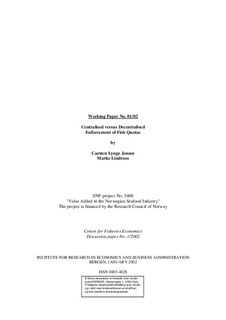| dc.contributor.author | Jensen, Carsten Lynge | |
| dc.contributor.author | Lindroos, Marko | |
| dc.date.accessioned | 2006-07-19T19:40:30Z | |
| dc.date.available | 2006-07-19T19:40:30Z | |
| dc.date.issued | 2002-01 | |
| dc.identifier.issn | 1503-2140 | |
| dc.identifier.uri | http://hdl.handle.net/11250/165808 | |
| dc.description.abstract | The purpose of this paper is to consider under what circumstances it is better to have centralised enforcement of catch quotas and when it is better to leave enforcement to the countries themselves. It is shown for a two-country case that a welfare gain is obtained under centralised enforcement at the federal level. The result depends critically on the difference in the unit cost of enforcement at the federal and the Member State (regional) level. If the Member States have a sufficiently large cost advantage in enforcing quotas they can be better off under decentralised enforcement. In addition, the result depends on the proportion of foreign fishermen in the domestic fishing zone. The higher is the proportion of foreign fishermen in the domestic zone the better is decentralised enforcement of quotas. | en |
| dc.format.extent | 189598 bytes | |
| dc.format.mimetype | application/pdf | |
| dc.language.iso | eng | en |
| dc.publisher | SNF/Centre for Fisheries Economics | en |
| dc.relation.ispartofseries | Working Paper | en |
| dc.relation.ispartofseries | 2002:1 | en |
| dc.relation.ispartofseries | Discussion Paper | en |
| dc.relation.ispartofseries | 2002:1 | en |
| dc.subject | quota enforcement policy | en |
| dc.subject | fisheries management | en |
| dc.title | Centralised versus decentralised enforcement of fish quotas | en |
| dc.type | Working paper | en |
| dc.type | Working paper | en |
